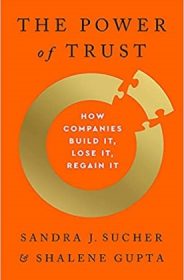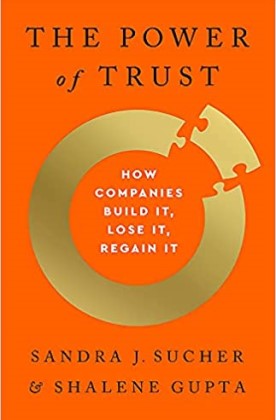Sandra Sucher is a professor of management practice at Harvard Business School, where she has been teaching for the last twenty years. She’s an advisor to the Edelman Trust Barometer, and has spoken about trust at Edelman and numerous companies and at Harvard Business School events. She provides expert commentary for Bloomberg, The New York Times, The Washington Post, The Wall Street Journal, NPR and Fortune. Prior to teaching at Harvard, Sucher had a two-decade career as a senior level executive and business ‘fixer,’ specializing in uncovering complex organization problems and creating new ways to address them. She lives in Massachusetts.
Shalene Gupta is a research associate at Harvard Business School. She is a former Fortune reporter, who covered diversity in Silicon Valley, big data and smart cities. She lives in Massachusetts.
About The Power of Trust: How Companies Build It, Lose It, Regain It
A ground-breaking exploration of the changing nature of trust and how to bridge the gap from where you are to where you need to be.
Trust, at every level of business and society, has never mattered so much and at the same time. CEOs, managers, presidents, governors – leaders at every level and in every institution – face vexing issues and trade-offs. Many flounder, especially in a turbulent era when confronted with multiple crises and constituencies demanding change. How to bridge these gaps requires a new understanding of just what trust is, how it can be built, and regained when lost.
Trust is, however, an elusive, even mushy, concept. Sandra Sucher and Shalene Gupta examine the science behind trust, grounding our understanding of why we humans trust in the first place, describing how customers, employees, community members and investors decide whether an organization or a person can be trusted. Creating and sustaining trust does not, they show, come from “reputation-building” and PR but by being the “real deal,” creating products, services, and technologies that work, having good intentions, treating people fairly, and taking responsibility for all the impacts an organization creates, whether intended or not.
Then, through a framing of how to think through the elements of trust – competence, motives, means, impact – combined with in-depth stories from twenty years of research we emerge with a new understanding of the business, economic and societal importance of trust and how to regain it once lost. How to, in short, bridge the gap from where you are to where you should be.



